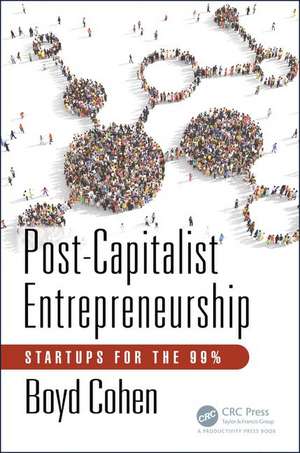Post-Capitalist Entrepreneurship
Autor Boyd Cohenen Limba Engleză Hardback – 21 sep 2017
Post-Capitalist Entrepreneurship: Startups for the 99% details the implications of the post-capitalist society on entrepreneurship around the globe, and it challenges many of our underlying assumptions about how entrepreneurs form startups and the objectives and roles, or lack thereof, of startup investors in a post-capitalist society. The author explores real emerging stories about different forms of post-capitalist entrepreneurship (PCE) with chapters dedicated to subjects such as platform cooperatives, alternative currencies (local, crypto, and time banking), and the emergence of blockchain-enabled Distributed Autonomous Organizations (DAOs).
This book will help aspiring and current entrepreneurs, investors and policymakers to:
- Understand emerging trends in new forms of economic activity that will shape the future of entrepreneurial opportunities
- Discover new approaches to business modeling in the post venture-capital opportunity space
- Embrace Lean startup and collaborative startup approaches that can accelerate startups in these new markets
- Recognize new spaces and avoid being disintermediated by new forms of startups and financing
- Know why and how local governments should reshape entrepreneurship policy to support post-capitalist entrepreneurship for the 99%
Preț: 241.01 lei
Nou
46.12€ • 47.88$ • 38.46£
Carte tipărită la comandă
Livrare economică 24 martie-07 aprilie
Specificații
ISBN-10: 1138713392
Pagini: 164
Ilustrații: 6 Line drawings, black and white; 2 Halftones, black and white; 2 Tables, black and white; 8 Illustrations, black and white
Dimensiuni: 156 x 234 x 17 mm
Greutate: 0.36 kg
Ediția:1
Editura: Taylor & Francis
Colecția Productivity Press
Locul publicării:Oxford, United Kingdom
Public țintă
Professional and Professional Practice & DevelopmentCuprins
Recenzii
- Nathan Schneider, University of Colorado Scholar in Residence, Co-founder, Platform Cooperativism
- Javier Creus, Founder, Ideas for Change
The book, picks up on the buzzy range of alternative forms of organizing in a post capitalist economy, and highlights the role of the next entrepreneurs in accelerating that. In this, through a range of fascinating case studies and working examples, the ideas are brought to life and brings with it an abiding optimism and positivism. In a world with much pain and angst, this book does the reader a service. Whilst not ignoring the perils, it serves to direct our gaze onto the good which is here right now, and then some - it stretches us to imagine what could be.
- Neil McInroy, CEO, Centre for Local Economic Strategies (CLES)
A very necessary, timely and optimist look at a post-capitalism future balancing what's technically feasible with what's socially desirable.
- Albert Cañuigueral, Ouishare Spain
- Michel Bauwens, Director and Founder, P2P Foundation
- Mara Balestrini, Research director at Ideas for Change and Project Manager at Fab Lab Barcelona
- Trebor Scholz, Associate Professor for Culture & Media, The New School and Co-founder, Platform Cooperativism
- Neil McInroy, CEO, Centre for Local Economic Strategies (CLES)
- Nathan Schneider, University of Colorado Scholar in Residence, Co-founder, Platform Cooperativism
- Javier Creus, Founder, Ideas for Change
The book, picks up on the buzzy range of alternative forms of organizing in a post capitalist economy, and highlights the role of the next entrepreneurs in accelerating that. In this, through a range of fascinating case studies and working examples, the ideas are brought to life and brings with it an abiding optimism and positivism. In a world with much pain and angst, this book does the reader a service. Whilst not ignoring the perils, it serves to direct our gaze onto the good which is here right now, and then some - it stretches us to imagine what could be.
- Neil McInroy, CEO, Centre for Local Economic Strategies (CLES)
- Albert Cañuigueral, Ouishare Spain
- Michel Bauwens, Director and Founder, P2P Foundation
- Mara Balestrini, Research director at Ideas for Change and Project Manager at Fab Lab Barcelona
- Trebor Scholz, Associate Professor for Culture & Media, The New School and Co-founder, Platform Cooperativism
- Neil McInroy, CEO, Centre for Local Economic Strategies (CLES)
- Michel Bauwens, Director and Founder, P2P Foundation
- Mara Balestrini, Research director at Ideas for Change and Project Manager at Fab Lab Barcelona
- Trebor Scholz, Associate Professor for Culture & Media, The New School and Co-founder, Platform Cooperativism
- Neil McInroy, CEO, Centre for Local Economic Strategies (CLES)
Descriere
Post-Capitalist Entrepreneurship: Startups for the 99% details the implications of the post-capitalist society on entrepreneurship around the globe, and it challenges many of our underlying assumptions about how entrepreneurs form startups and the objectives and roles, or lack thereof, of startup investors in a post-capitalist society. The author explores real emerging stories about different forms of post-capitalist entrepreneurship (PCE) with chapters dedicated to subjects such as platform cooperatives, alternative currencies (local, crypto, and time banking), and the emergence of blockchain-enabled Distributed Autonomous Organizations (DAOs).
This book will help aspiring and current entrepreneurs, investors and policymakers to:
- Understand emerging trends in new forms of economic activity that will shape the future of entrepreneurial opportunities
- Discover new approaches to business modeling in the post venture-capital opportunity space
- Embrace Lean startup and collaborative startup approaches that can accelerate startups in these new markets
- Recognize new spaces and avoid being disintermediated by new forms of startups and financing
- Know why and how local governments should reshape entrepreneurship policy to support post-capitalist entrepreneurship for the 99%



























